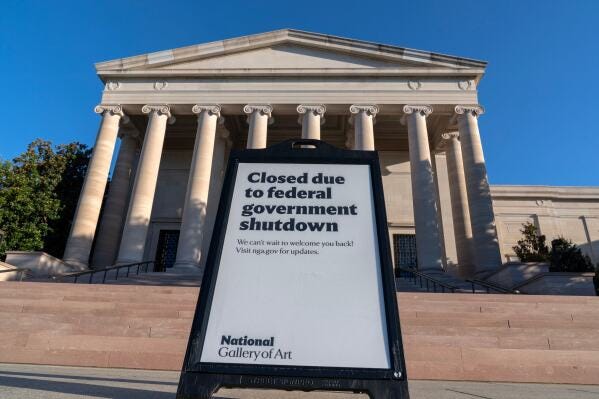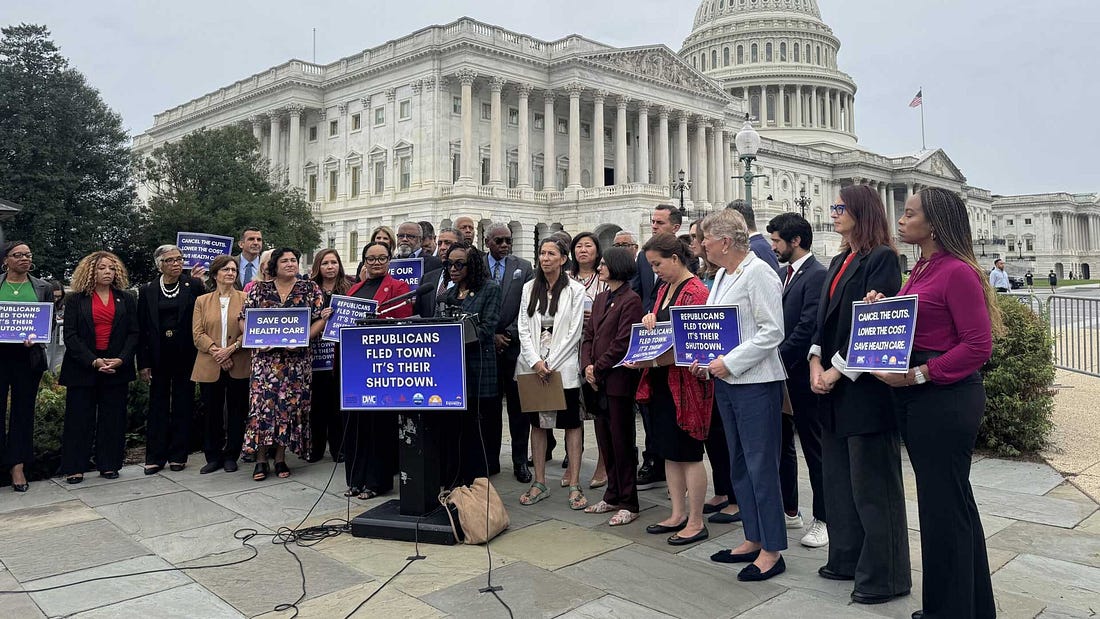A Modest Proposal - Government Shutdown EditionIf the federal government can shut down temporarily, why not permanently?** This is the sixth in a recurring series, in which I offer some modest proposals – in the venerable tradition of Jonathan Swift – for American and international politics. ** As you may know, we are currently in the midst of a government shutdown. The federal government has partially closed up shop, furloughed employees, and suspended certain non-essential services and activities. Lasting just over two weeks as of this writing, the current shutdown is the fifth-longest ever, but could very easily rise higher on that list – the longest was in 2018-19, when the government remained ‘closed’ for 35 days. These shutdowns are always related to an impasse over funding legislation in Congress, and this one is no different. The House of Representatives, controlled by a very slim Republican majority, has passed a basic funding bill which would keep the government operating under the same budget as was passed earlier this year. The Senate, which Republicans also control, has been unable to pass this same bill, entirely due to the different rules in that chamber. The legislative filibuster requires 60 votes to pass such legislation, and the GOP holds only 53 seats. Some Democrats have voted with Republicans to fund the government, but Rand Paul (R-KY) opted to do the inverse. Naturally, both sides have blamed the other for the inability to pass this extremely basic legislation. Democrats claim that Republicans want to shut the government to hurt the poor, gut Obamacare, and forward the authoritarian takeover of the nation by Donald Trump. Republicans argue that Democrats are holding the government hostage in order to reverse portions of the governing party’s already-passed agenda and make permanent what are currently temporary health insurance subsidies. Generally, the party out of power is the one blamed for the shutdown, but this can vary. Democrats, by and large, also have more to lose in a shutdown given that their voters are disproportionately impacted – most federal workers are Democrats and live in blue states – and they are seen as the party of government. Personally, I don’t much care about this. I think it is dumb and distracts from far more important issues that impact our nation, like foreign affairs, economic policymaking, and immigration enforcement. So, you may ask, why am I writing about it? Well, this shutdown got me thinking: if the government can shut down and still function well enough to negotiate international treaties, regulate the very basics of the economy, and enforce our laws, why does it need to be open in the first place? The workers that have been furloughed are considered non-essential, as are the activities they carried out as part of their employment. Once the government reopens, they will return to their desks and continue whatever work they were hired to do, all with plenty of back pay for the time they actually didn’t work. But what if those jobs were entirely unnecessary? What if those actions were simply not important? As of now, the biggest shutdown story revolves around reduced staffing at national parks. I love our national parks, but if that’s the most meaningful impact from a closure of the federal government, it’s pretty thin gruel. The only other sob stories from this shutdown are related to federal workers missing paychecks. But hear me out: what if we just fired anyone who is doing government work that is considered non-essential? Then they could find real jobs and not miss paychecks when Congress can’t get their heads out of their collective asses for long enough to pass a basic budget. Given the way Congress has withered into uselessness over the past several decades, this will surely not be the last shutdown, so this may be an appealing trade for the non-essential federal workforce. On the other hand, based on the effectiveness of the federal government, they seem to get paid to do absolutely nothing. So perhaps that’s a better deal for them. But it sucks for us taxpayers! The federal government has drastically expanded its power and reach for over a century now, starting in earnest with Woodrow Wilson (our worst president), ramping up mightily with Franklin Roosevelt, growing further with Lyndon Johnson, and reaching its apotheosis under Barack Obama and Joe Biden. For Democrats in the mold of those presidents, no expansion of federal power is bad. The more that the government does, removing responsibility from states, localities, civil society, and individuals, the better. As a classical American constitutional conservative, this is the antithesis of what I believe. Power should be located as close to the source – the voter – as possible. Issues should be fixed from the ground up, not the top down. The federal government should focus exclusively on purely national issues – defense, immigration, foreign trade, interstate commerce (very narrowly defined), multistate infrastructure projects (energy included), and international affairs, to name a few. Those are the tasks that are truly essential to the functioning of our nation at the highest level. Anything else, particularly the activities that are deemed non-essential enough to simply not bother with during a budgetary debate, should be cast aside. Not only would this help fix our massive deficit and debt problem, one driven almost entirely by entitlement programs, it would reorient our society in a far more useful direction. We don’t need to nationalize and exaggerate every single political issue into the be-all end-all of our lives. In a stable, prosperous society like ours, national politics should be almost meaningless to the average person. They should be able to live their lives – forming families, engaging in remunerative work, joining civil society institutions, having hobbies and leisure time – without thinking about Congress, the president, or the Supreme Court. They should be trusted with personal responsibility to make decisions about their own lives, not be micromanaged from Washington DC. Let a thousand flowers bloom. Get government out of the way and watch America do what America does best: succeed. So here’s my modest proposal: make the shutdown permanent. Leave the government closed. End non-essential activities. Cut the fat. Prioritize only what is truly necessary to have a functioning national government. Leave the rest to states, localities, civil society, business, and, most importantly, individual Americans. Or, if you don’t want to go that far, at least stop paying Congress in the meantime. Rational Policy is free today. But if you enjoyed this post, you can tell Rational Policy that their writing is valuable by pledging a future subscription. You won't be charged unless they enable payments. |
Thursday, 16 October 2025
A Modest Proposal - Government Shutdown Edition
Subscribe to:
Post Comments (Atom)
A Modest Proposal - Government Shutdown Edition
If the federal government can shut down temporarily, why not permanently? ͏ ͏ ͏ ͏ ͏ ͏ ͏ ͏ ͏ ͏ ...
-
https://advanceinstitute.com.au/2024/04/24/sunnycare-aged-care-week-10/?page_id=...
-
barbaraturneywielandpoetess posted: " life on a rooftop can be short ; depends whether one looks down or up . ...


No comments:
Post a Comment